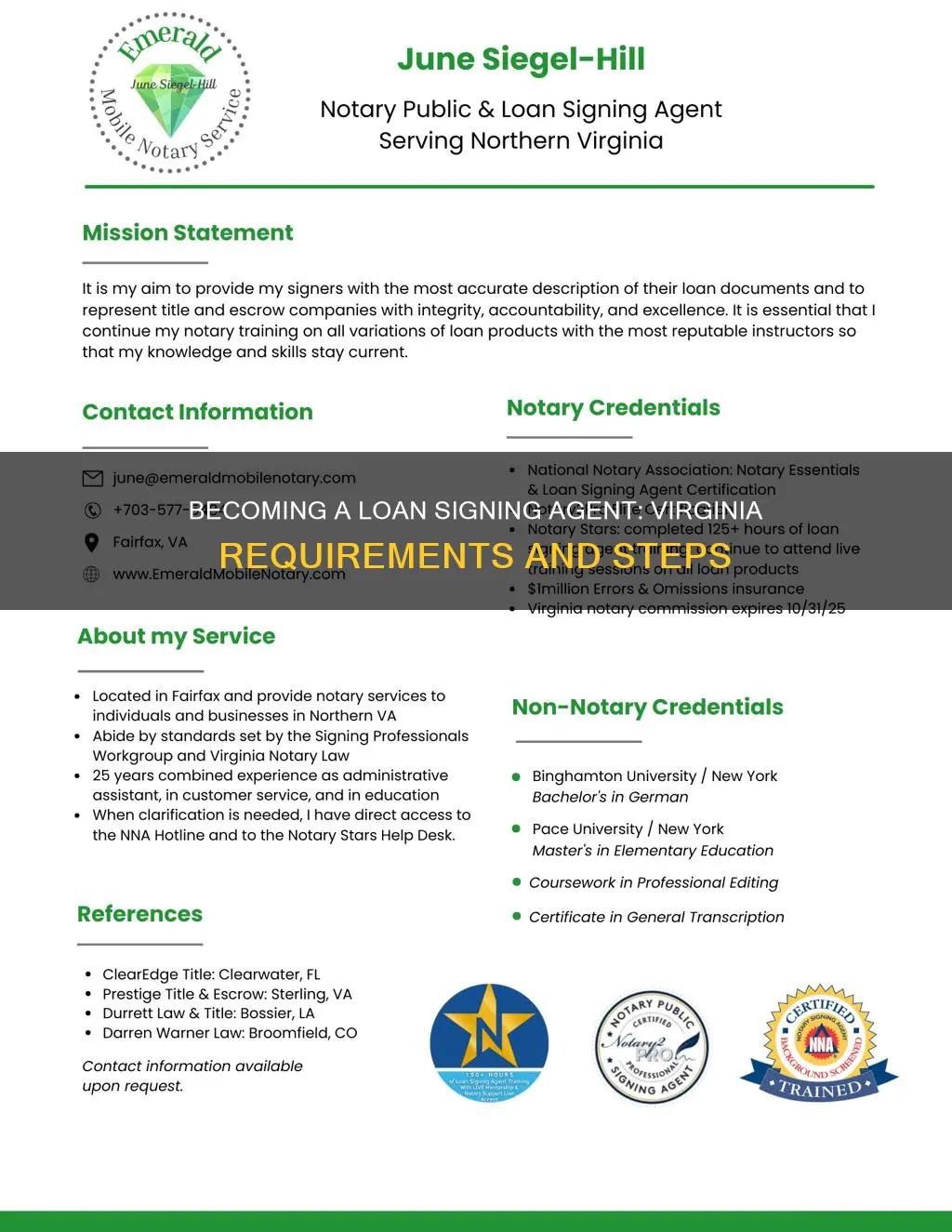
If you're interested in becoming a loan signing agent in Virginia, there are a few key steps you need to take. Firstly, it's important to understand the role of a loan signing agent, which involves guiding borrowers through loan document signings, acknowledging their signatures, and returning documents to the lender. While no extra legal qualifications are required in Virginia, specialized training is highly recommended to enhance your competence and employability. The next step is to get commissioned as a notary public in Virginia, which will allow you to pursue opportunities as a loan signing agent. After that, you'll need to purchase the necessary notary supplies, including a stamp or seal and a notary journal. Keep in mind that Virginia has specific restrictions, such as not handling funds in connection with loan signings. By following these steps, you'll be well on your way to becoming a successful loan signing agent in Virginia.
| Characteristics | Values |
|---|---|
| Qualifications | No legal qualifications are required to become a Notary Signing Agent in Virginia. |
| Training | No training or exam is required in Virginia, but specialized training is strongly recommended to improve your competence and employability. |
| Commission | You must be commissioned as a notary public in Virginia to become a loan signing agent. |
| Supplies | You will need to purchase a notary stamp or seal, as well as a notary journal or record book. |
| Insurance | E&O insurance is optional but recommended for financial protection in case of errors, omissions, or negligence. |
| Restrictions | In Virginia, NSAs cannot handle funds in connection with loan signings or real estate closings unless they have a title insurance license. |
What You'll Learn
- No legal qualifications are required to become a loan signing agent in Virginia
- It is recommended that you undertake specialised training to become a more appealing candidate
- You must be commissioned as a notary public in Virginia
- You will need to purchase your notary supplies, including a stamp or seal
- E&O insurance is required to become SPW compliant

No legal qualifications are required to become a loan signing agent in Virginia
First, you must become a commissioned notary public in Virginia. This will require you to purchase some supplies, including a notary stamp or seal to indicate an official mark or impression on a document. You will also need a notary journal or record book to log the details of each notarization, serving as a record and evidence of a signer's identity and the actions of all parties involved.
While Virginia does not require training or exams, undertaking specialized training is strongly recommended. This will make you a more appealing candidate to lenders, title companies, and other industry recruiters, who typically prefer NSAs with specific training due to the complexity of loan signings. It will also ensure that you are capable of competently fulfilling all the responsibilities associated with being an NSA.
As a loan signing agent, you will guide borrowers through loan document signings, indicating where they need to sign, date, and initial. You will also acknowledge their signatures and return the documents to the lender. Millions of transactions happen every year when someone buys a home, sells a home, or refinances, and these are required by law to be notarized.
Finally, while Virginia does not require a surety bond, and insurance is optional, you will likely want to purchase a comprehensive E&O insurance policy. This will provide financial protection in the case of errors, omissions, or negligence during the notarization process, safeguarding you from potential liability and legal expenses.
Understanding Package Loans: What You Need to Know
You may want to see also

It is recommended that you undertake specialised training to become a more appealing candidate
While no extra legal qualifications are required to become a Notary Signing Agent (NSA) in Virginia, specialised training is strongly recommended. This is because it makes you a more appealing candidate to lenders, title companies, and other industry recruiters, who usually prefer NSAs with specific training due to the complex nature of loan signings. It also ensures you are capable of competently fulfilling all the responsibilities associated with being an NSA.
Specialised training can help you become more comfortable in your role and prevent you from making mistakes and costly errors. For example, you will learn that as an NSA, you can offer notarial services without a title insurance license, as long as you don't handle any money and work on behalf of a registered settlement agent with a proper license. Your role is primarily to verify the identities of the involved parties, oversee the signing of documents, and notarise these signatures.
You can find state-specific training through online platforms, such as Notary Signing Agent Blueprint, which offers expert online certification training, mentorship, and a private community all designed to help you succeed. The National Notary Association also offers packages that include everything you need to get started, including background screening, certification training, and an exam.
Additionally, you may want to consider training in Remote Online Notarization (RON), a new trend where notarizations and loan closings can happen via online webcam. This allows you to work remotely and could open up more opportunities for you as a Notary Signing Agent.
Becoming a Loan Signing Agent: Nevada Requirements
You may want to see also

You must be commissioned as a notary public in Virginia
To become a loan signing agent in Virginia, you must first be commissioned as a notary public in the state. This is a mandatory step to qualify for the role of a loan signing agent.
The role of a notary public is similar to that of a loan signing agent or Notary Signing Agent (NSA). However, the distinction lies in the level of expertise required for each task. As a loan signing agent, you will be guiding borrowers through loan document signings, acknowledging their signatures, and returning documents to the lender. This requires specialized training, which is strongly recommended even though it is not a legal requirement in Virginia.
Specialized training will make you a more appealing candidate to lenders, title companies, and other industry recruiters. It will also ensure that you are capable of competently fulfilling all the responsibilities associated with being an NSA. You can opt for virtual classes that are Virginia state-specific and include details of RESA restrictions in the state. These classes are cost-effective and can be taken from any device and location.
Once you are commissioned as a notary public in Virginia and have completed the necessary training to become a loan signing agent, you will need to purchase your notary supplies. These include a notary stamp or seal to indicate an official mark or impression on a document, and a notary journal or record book to log the details of each notarization.
Understanding Loan Collateral: True Statements Explained
You may want to see also

You will need to purchase your notary supplies, including a stamp or seal
Once you have been commissioned as a notary public and have completed the necessary training to become a loan signing agent, you will need to purchase your notary supplies. This includes a notary stamp or seal, which is used to indicate an official mark or impression on a document to prove its authenticity. This mark or impression is your unique signature as a notary public and loan signing agent, and it serves as evidence of the signer's identity and the actions of all parties involved in the transaction.
In addition to the stamp or seal, you will also need to purchase a notary journal or record book. This is a log where you can record details of each notarization, serving as a further record and evidence of the identities of the signers and the actions of all parties. This record book is an important tool to help you maintain accurate and complete records of your notary services.
You may also want to consider purchasing a comprehensive E&O insurance policy. While this is not a requirement to become a loan signing agent in Virginia, it is a requirement for becoming SPW compliant. E&O insurance provides financial protection in the event of errors, omissions, or negligence during the notarization process, safeguarding you from potential liability and legal expenses. This type of insurance can provide peace of mind and financial security as you carry out your duties as a loan signing agent.
Another important supply to consider is a secure method of transporting your notary stamp or seal, such as a locked briefcase or bag. As a loan signing agent, you may be required to travel to meet clients or signers, and it is crucial that your stamp or seal is protected and secure at all times. This will help to maintain the integrity and security of your notary services and ensure that your supplies are not lost or stolen.
By purchasing these necessary notary supplies, you will be well-equipped to begin your career as a loan signing agent in Virginia. These tools will enable you to perform your duties effectively, efficiently, and in compliance with the law. Remember to keep yourself updated with any changes in state or federal regulations that may impact your role as a notary public and loan signing agent.
Steps to Becoming a Loan Signing Agent in Pennsylvania
You may want to see also

E&O insurance is required to become SPW compliant
To become a loan signing agent in Virginia, you must first become a commissioned notary public in the state. Although no extra legal qualifications are required to become a notary signing agent (NSA) in Virginia, undertaking specialized training is strongly recommended. This training will make you a more appealing candidate to lenders, title companies, and other industry recruiters. It will also ensure that you are capable of competently fulfilling all the responsibilities associated with being an NSA.
Once you have been commissioned as a notary public and have spent time becoming qualified as a loan signing agent, you will need to purchase your notary supplies. Loan signing agents will need a notary stamp or seal to indicate an official mark or impression on a document to demonstrate its authenticity. You will also need a notary journal or record book, which is a log where you can record details of each notarization, serving as a record and evidence of a signer's identity and actions of all parties involved.
While insurance is optional for notary signing agents in Virginia, you will likely want to purchase a comprehensive E&O insurance policy to become SPW compliant. E&O insurance, also known as errors and omissions insurance or professional liability insurance, is a type of insurance that provides financial protection in case of errors, omissions, or negligence during the notarization process, safeguarding you from potential liability and legal expenses. It helps protect your business from lawsuits that claim you made a mistake in your professional services. This insurance can help cover your attorney fees, court costs, and settlements, which can be very expensive for your business to pay. For example, attorney fees can cost an average of $3,000 to $150,000.
The cost of E&O insurance varies depending on the size and nature of your business, but the average premium for a small business is around $735 a year. You can also help keep your E&O insurance cost down by choosing a policy that covers the specific risks associated with your business. Every E&O policy is different, so it is important to carefully read your policy to understand coverages, exclusions, limits, deductibles, and other key policy considerations.
FAFSA Loans: Accepted in the UK?
You may want to see also
Frequently asked questions
To become a loan signing agent in Virginia, you must first become a commissioned notary public in Virginia. There are no extra legal qualifications, training, or exams required to become an NSA in Virginia. However, specialized training is strongly recommended to make you a more appealing candidate to lenders and to ensure you are capable of fulfilling all the responsibilities associated with being an NSA. After becoming a notary public, you will need to purchase your notary supplies, including a notary stamp or seal and a notary journal or record book.
Loan signing agents guide borrowers through loan document signings, acknowledging their signatures, and returning documents to the lender. They also verify the identities of the involved parties and notarize these signatures.
Mobile Notary Signing Agents in Virginia can make $75-$200 per loan closing.
While the roles are similar on the surface, the distinction lies in the level of expertise required for each task.







